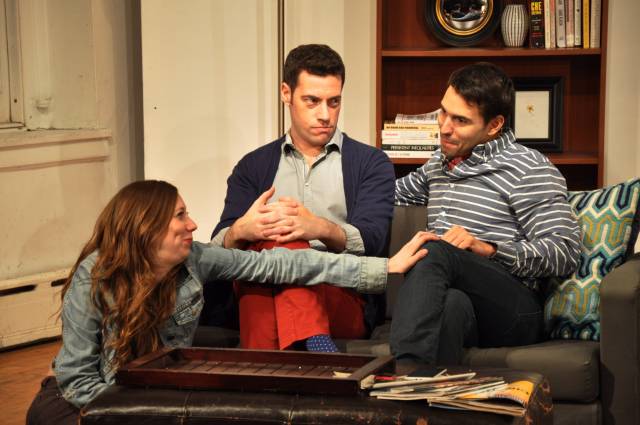

Within the first few minutes of ReLateAble at the New York International Fringe Festival, the audience is fully aware of the apparently apocalyptic situation that will provide much of the dramatic propulsion of the piece. All of our modern means of communication are mysteriously out-of-service: The internet is down, cell phones won’t text, and the roommates at the center of this play are left to speak to each other the old-fashioned way.
Derran Moss-Dalmau’s script makes the best of this situation when it allows its characters to speak freely. Everyone here is witty and wordy in that endearingly unrealistic way, and while the dialogue almost never sounds like actual human speech, it is full of unexpected turns and welcomed nuances. The actors, too, take advantage of these moments – most notably the refreshingly low-energy Emmanuelle Bernard as Ann, the private romantic who dresses herself as a cynic.
It is Ann’s opposition to the perspective of her roommate Jon (Bautista Duarte, who is full of movement and life – and who also directed this production) that forms the only real external conflict of the play. Despite Ann’s spectacularly failed recent five-year relationship, she insists that love is a magical, spontaneous phenomenon, one that cannot be planned or prepared for. Jon, on the other hand, has a first date tonight (that is strangely set in their apartment) and is near-manic over his inability to do his research on the man he’s meeting.
This conflict fits neatly with the broken technology situation that the roommates (and all of New York City) are in; without accessing Facebook, Instagram and Twitter, Jon has no means of doing a personalized background check on his date. Where Jon is petrified, Ann is elated – surely, this is how love can blossom unfettered, she feels.
The problems with Moss-Damau’s script come in the form of repetition. There are subtle ways to hint at these contrasting perspectives on love and communication, but in ReLateAble, the exact details of the Jon and Ann’s viewpoints are repeated so often that it almost feels insulting. The play is full of strong dialogic moments and more-than-capable actors, so a script more in touch with subtext would surely improve such a collaboration.